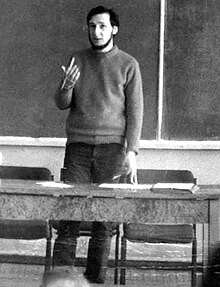Boris Kagarlitsky | |
|---|---|
Борис Кагарлицкий | |
 Kagarlitsky in 2011 | |
| Born | 29 August 1958 |
| Alma mater | State Institute of Theatrical Art (GITIS) Moscow State Social University |
| Era | Contemporary philosophy |
| Region | Western philosophy Russian philosophy |
| School | Marxism[1] World-systems theory[2] |
Main interests | Philosophy, sociology, labour, history, class struggle |
Boris Yulyevich Kagarlitsky (Russian: Бори́с Ю́льевич Кагарли́цкий; born 29 August 1958) is a Russian Marxist theoretician and sociologist who has been a political dissident in the Soviet Union and the Russian Federation. He is an associate of the Transnational Institute.[3] Kagarlitsky is the director of Institute of Globalisation Studies and Social Movements (IGSO)[4] and editor in chief of Levaya Politika (Left Politics) quarterly in Moscow. Kagarlisky hosts a YouTube channel Rabkor, associated with his online newspaper of the same name.[5]

In the 1970s, he studied theatre criticism at the State Institute of Theatrical Art (GITIS), before being expelled for dissident activities in 1980. His editorship of the samizdat journal Levy Povorot (Left Turn) from 1978 to 1982, and contributions to the samizdat journal Varianty (Variants) during the same period, led to his arrest for 'anti-Soviet' activities in 1982. He was pardoned and released in 1983.
In 1988 he published his book, The Thinking Reed: Intellectuals and the Soviet State From 1917 to the Present, which won the Deutscher Memorial Prize.
In 1988, after the rise of Mikhail Gorbachev and perestroika, he was permitted to resume his studies at the GITIS, graduating in the same year, and became coordinator of the Moscow People's Front. In 1990, he was elected to the Moscow City Soviet and to the Executive of the Socialist Party (USSR).

He co-founded the Party of Labour (Russia) in October 1992. In October 1993, the former Soviet dissident was arrested, with two other members of his party, for his opposition to President Boris Yeltsin during the September–October constitutional crisis, but was released the next day after international protests. Later that year, his job and the Moscow City Soviet were abolished under Yeltsin's new constitution. The events and his experiences during this momentous period are documented in his book, Square Wheels: How Russian Democracy Got Derailed. His 2005 historical essay Marxism: not recommended for teaching. was criticized by Mikhail Vasilyevich Popov.[6]
In 2022 Kagarlitsky was designated a foreign agent by Russian authorities.[7] On the 25th of July 2023, Russia's Federal Security Service opened a criminal case against Kagarlitsky.[8] He was arrested on charges of "justifying terrorism" on 26 July 2023 according to Russian state agencies, as part of a wider crackdown on outspoken critics of the 2022 Russian invasion of Ukraine.[7] In December 2023, he was charged 600 000 rubles fine on this charge.[9]
In February 2024 his sentence was changed to 5 years detention in a prison colony.[10]
After his arrest in 2023 the Kagarlitsky Solidarity Committee was formed and signed by public and political figures around the world: Jean-Luc Melenchon, Jeremy Corbyn, Slavoj Žižek, Nadya Tolokonnikova and many others.[11]
From 1994 to 2002, he was a senior research fellow at the Institute for Comparative Political Studies of the Russian Academy of Sciences (ISPRAN). He was awarded his Doctorate degree for his thesis, "Collective Actions and Labour Policies in Russia in the 90s," in 1995, and has taught political science at Moscow State University, the Moscow School for Social and Economic Sciences, and the Institute of Sociology of the Russian Academy of Sciences.
According to Kagarlitsky, his paternal family descends from Ilya Kagarlitsky, a successful Jewish businessman from the Ukrainian city Kaharlyk. His mother comes from an Orthodox Christian family.[12] He has a daughter, Ksenia.[13]